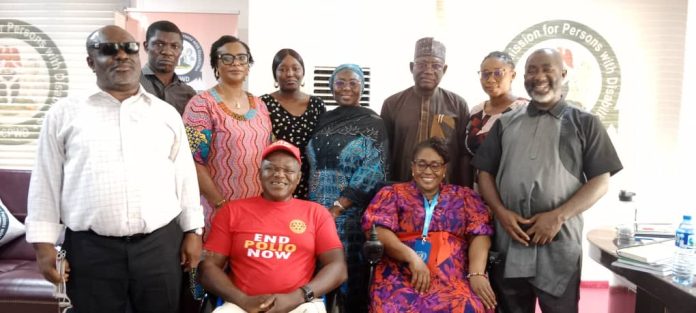High-Level Engagement Seeks to Tackle Accessibility Gaps, Funding Shortfalls, and Policy Implementation
Abuja, Nigeria – February 26, 2025
In a significant step towards enhancing disability rights and inclusion, the National Commission for Persons with Disabilities (NCPWD) has deepened its collaboration with the United Nations (UN) in Nigeria. The Executive Secretary of the Commission, Hon. Ayuba Gufwan, on Tuesday welcomed the UN Inclusion Coordinator in Nigeria, Madam Ekaite Judith Umoh, for a strategic meeting aimed at addressing systemic challenges hindering full inclusion and accessibility for Persons with Disabilities (PWDs).
The high-level engagement, which took place at the Commission’s headquarters in Abuja, focused on critical issues such as infrastructural development, data-driven policy-making, funding deficits, and the decentralization of disability services across Nigeria.
Funding Gaps and Accessibility Challenges: The Commission’s Reality
Hon. Gufwan did not mince words in outlining the pressing challenges facing the Commission, emphasizing that without significant financial backing and infrastructure investment, disability inclusion efforts would remain inadequate.
One of the most glaring issues, he highlighted, is that the NCPWD currently operates from a rented facility, making it difficult to implement essential structural modifications that would make the space fully accessible to PWDs. He stressed that a permanent, disability-friendly office complex is crucial for the effective operations of the Commission.
Beyond infrastructure, Gufwan pointed out that accurate and extensive data collection on PWDs is urgently needed to guide evidence-based policymaking. Without reliable statistics, he warned, policies would continue to be designed in a vacuum, failing to address the real needs of Nigeria’s over 35 million persons with disabilities.
Perhaps the most alarming revelation was the severe financial shortfall crippling the Commission’s effectiveness. According to Gufwan, a minimum of ₦60 billion is required to develop the necessary infrastructural and accessibility projects that will cater to PWDs nationwide. However, only ₦2 billion has been approved—a sum he described as grossly insufficient to meet the needs of Nigeria’s disability community.
“We are expected to cater to the needs of over 35 million Persons with Disabilities in Nigeria with only ₦2 billion, when in reality, the infrastructural demands alone require at least ₦60 billion,” Gufwan stated. “This funding gap is a serious limitation to achieving true disability inclusion in Nigeria.”
Decentralizing Services: Bringing Disability Support Closer to the People
Recognizing the logistical and financial challenges PWDs face in accessing support, Gufwan called for the establishment of NCPWD state liaison offices across Nigeria’s 36 states and local engagement centers in all 774 local government areas.
He explained that currently, many PWDs are forced to travel long distances to Abuja just to access essential services—a burden that could be eliminated with well-structured decentralized offices at the grassroots level.
“Disability services should not be concentrated only in Abuja,” he stressed. “We need functional state and local government liaison offices so that persons with disabilities, regardless of where they live, can access the support they need without excessive travel costs and stress.”
A Call for Multi-Sectoral Partnerships
While government support remains crucial, Gufwan acknowledged that multi-sectoral collaboration is essential for meaningful progress. He reaffirmed his commitment to engaging private sector stakeholders, non-governmental organizations, and global development partners—with a special emphasis on strengthening ties with the United Nations.
UN’s Commitment to Disability Inclusion in Nigeria
In response, Madam Ekaite Judith Umoh, the United Nations Inclusion Coordinator in Nigeria, expressed deep concern over the limited financial resources allocated to the Commission. She reaffirmed the UN’s commitment to disability inclusion, pledging to work closely with the NCPWD to ensure greater implementation of accessibility regulations and other strategic interventions.
“We need to hit the ground running,” Umoh stated. “The funding gap is unacceptable, and we will work alongside the Commission to push for real action in ensuring that PWDs are not left behind.”
Breakthrough in Disability-Inclusive Education
Beyond financial and infrastructural concerns, the NCPWD also presented a structured approach to systemic reforms, particularly in the education sector.
The Commission unveiled a Standard Operating Procedure (SOP) on Inclusion and Access of Persons with Disabilities to Pre-Tertiary Education—a groundbreaking manual designed to guide classroom teachers in delivering inclusive education.
“Education is the foundation of an inclusive society,” Gufwan remarked. “Without structured guidelines for inclusive education, we risk excluding millions of children with disabilities from quality learning opportunities.”
Key Policy Documents Handed Over to the UN
As part of the meeting’s outcomes, the NCPWD formally presented five critical policy documents to the United Nations Inclusion Coordinator, marking a significant step towards institutionalizing disability inclusion at both national and local levels.
The key documents include:
- Local Government Disability Framework – A roadmap for integrating disability inclusion in local governance structures.
- National Commission for Persons with Disabilities Accessibility Regulations – A set of legal guidelines ensuring accessibility compliance in public and private infrastructure.
- Five-Year Strategic Plan – A long-term blueprint for advancing disability rights and services across Nigeria.
- National Standard Operating Procedures on Inclusion and Access of Persons with Disabilities to Pre-Tertiary Education – A framework guiding inclusive education policies.
- Framework for the National Access-to-Work Scheme for Persons with Disabilities in Nigeria – A policy document aimed at increasing employment opportunities for PWDs.
The meeting concluded with a formal handover of these key documents, symbolizing the strengthened alliance between the NCPWD and the UN in pushing for more robust disability rights and inclusion policies in Nigeria.
Looking Ahead: Will This Partnership Drive Real Change?
While the engagement between the NCPWD and the United Nations signals renewed momentum in disability advocacy, the true test lies in implementation.
With over 35 million Nigerians living with disabilities, the stakes are incredibly high. Will the government and stakeholders take decisive action to bridge the funding gap? Will infrastructural improvements be fast-tracked? Will inclusive policies move beyond documentation to real-life impact?
For now, persons with disabilities across Nigeria are watching closely, hoping that this partnership will not just be another policy discussion, but a turning point for real, lasting change.


